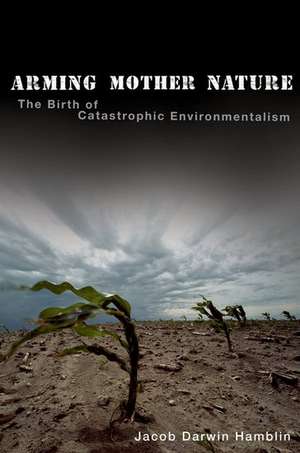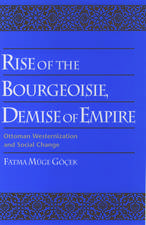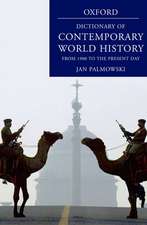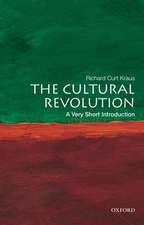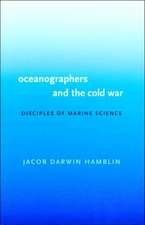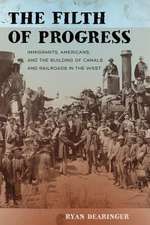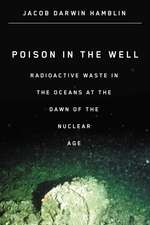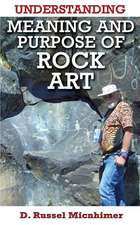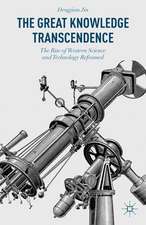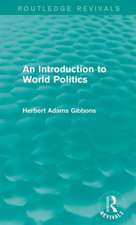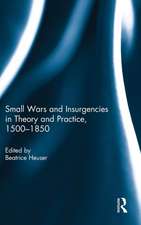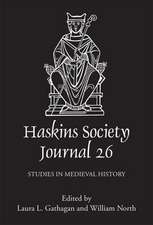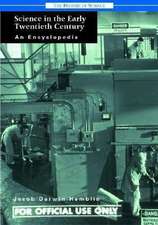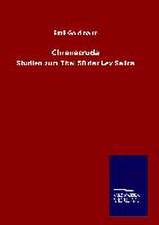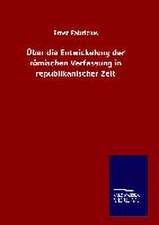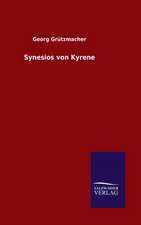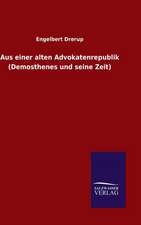Arming Mother Nature: The Birth of Catastrophic Environmentalism
Autor Jacob Darwin Hamblinen Limba Engleză Paperback – 30 mar 2017
| Toate formatele și edițiile | Preț | Express |
|---|---|---|
| Paperback (1) | 199.73 lei 32-37 zile | |
| Oxford University Press – 30 mar 2017 | 199.73 lei 32-37 zile | |
| Hardback (1) | 182.74 lei 32-37 zile | |
| Oxford University Press – 23 mai 2013 | 182.74 lei 32-37 zile |
Preț: 199.73 lei
Preț vechi: 246.17 lei
-19% Nou
Puncte Express: 300
Preț estimativ în valută:
38.22€ • 39.98$ • 31.75£
38.22€ • 39.98$ • 31.75£
Carte tipărită la comandă
Livrare economică 24-29 martie
Preluare comenzi: 021 569.72.76
Specificații
ISBN-13: 9780190674151
ISBN-10: 0190674156
Pagini: 320
Dimensiuni: 155 x 234 x 23 mm
Greutate: 0.44 kg
Editura: Oxford University Press
Colecția OUP USA
Locul publicării:New York, United States
ISBN-10: 0190674156
Pagini: 320
Dimensiuni: 155 x 234 x 23 mm
Greutate: 0.44 kg
Editura: Oxford University Press
Colecția OUP USA
Locul publicării:New York, United States
Recenzii
With this book Jacob Hamblin makes a major contribution to our understanding of the decisive role of military priorities and military funding in the shaping of a wide range of environmental sciences. As a contribution to the historiography of science as conditioned by its political, ideological, social, and financial contexts, Arming Mother Nature shows how the ideologies and international institutions of the Cold War shaped the rise of fundamental environmental sciences.... A carefully crafted, powerfully articulated study of one of the most important dimensions of today's environmental policy debate.... The book is a weighty example of the importance of environmental history research in relation to the public realm.
[A] fascinating and often disturbing history
In Arming Mother Nature, Jacob Hamblin offers a far-reaching and provocative account of just how dependent narratives of global climate change are upon the military support, apocalyptic scenarios, and political ideology that shaped the growth of the modern environmental sciences during the Cold War.
[T]hought-provoking
This book advances the intriguing idea that 'catastrophic environmentalism' is not standard rhetoric warning the public about climate change and extinction of species, but a strategy developed by the Pentagon to fight the Cold War. Recommended.
A well-written and -documented challenge of some of the assumptions on both sides in the debate about global warming.
Jacob Hamblin's new book is a clearly and calmly told tale of the American effort to conscript nature -from the seafloor to the stratosphere -for potential active duty during the Cold War. Well researched in U.S. and European archives, it finds the roots of modern apocalyptic environmentalism in the hair-raising deeds and often hare-brained schemes of an American scientific-military complex under pressure to find ways to prevail against the USSR. It sheds new light on the old adage that is a miracle anyone survived the Cold War."
[A] fascinating and often disturbing history
In Arming Mother Nature, Jacob Hamblin offers a far-reaching and provocative account of just how dependent narratives of global climate change are upon the military support, apocalyptic scenarios, and political ideology that shaped the growth of the modern environmental sciences during the Cold War.
[T]hought-provoking
This book advances the intriguing idea that 'catastrophic environmentalism' is not standard rhetoric warning the public about climate change and extinction of species, but a strategy developed by the Pentagon to fight the Cold War. Recommended.
A well-written and -documented challenge of some of the assumptions on both sides in the debate about global warming.
Jacob Hamblin's new book is a clearly and calmly told tale of the American effort to conscript nature -from the seafloor to the stratosphere -for potential active duty during the Cold War. Well researched in U.S. and European archives, it finds the roots of modern apocalyptic environmentalism in the hair-raising deeds and often hare-brained schemes of an American scientific-military complex under pressure to find ways to prevail against the USSR. It sheds new light on the old adage that is a miracle anyone survived the Cold War."
Notă biografică
Jacob Darwin Hamblin is Associate Professor of History at Oregon State University. His books include Poison in the Well: Radioactive Waste in the Oceans at the Dawn of the Nuclear Age, Oceanographers and the Cold War, and Science in the Early Twentieth Century: An Encyclopedia.
